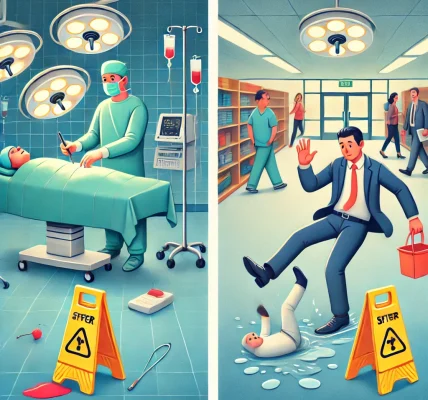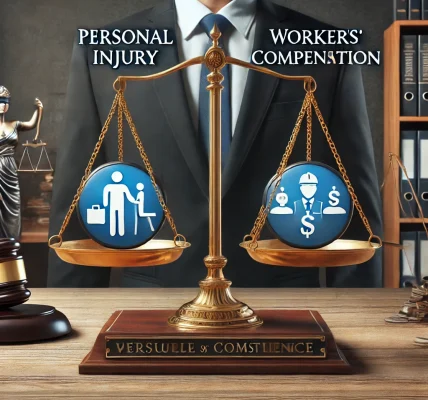Personal injury accidents can be overwhelming, and knowing what to do in the moments following an incident can make a significant difference in protecting your health, legal rights, and potential compensation. Whether it’s a car accident, slip and fall, or workplace injury, taking the right steps immediately can strengthen your claim and ensure a smooth legal process.
This guide provides a detailed, SEO-friendly, and legally safe breakdown of the 10 most crucial steps to take after a personal injury accident. Following these steps can help you stay protected and avoid common mistakes.
1. Ensure Your Safety First
Your safety is the top priority. If you are in immediate danger, such as being on a busy road after a car accident, move to a safer location if possible. If you suspect a severe injury, try not to move unnecessarily and wait for medical help.
Tips:
- If in a vehicle accident, turn on hazard lights to alert other drivers.
- In a public place, such as a store, notify a staff member of the accident.
- If at work, inform your supervisor immediately.
2. Call Emergency Services (911)
Always contact emergency services after a serious injury accident. Medical professionals can assess your condition, and law enforcement officers can create an official accident report, which serves as crucial evidence for any future claims.
Why it matters:
- A police report provides an official record of the incident.
- Immediate medical attention prevents minor injuries from worsening.
3. Document the Scene with Photos and Videos
If you are physically able, take clear photos and videos of the accident scene. Capture different angles, visible injuries, property damage, weather conditions, and any relevant signage.
Key elements to capture:
- The cause of the accident (e.g., wet floors, defective machinery, reckless driving).
- Any injuries sustained.
- Contact information of involved parties and witnesses.
4. Gather Contact Information from Witnesses and Involved Parties
Collect the names, phone numbers, and addresses of anyone involved in or who witnessed the accident. In case of a car accident, get the other driver’s license details, insurance information, and vehicle registration number.
Avoid:
- Discussing fault or admitting guilt, as this may impact your claim later.
5. Seek Medical Attention Immediately
Even if you feel fine, get a medical evaluation. Some injuries, like concussions or internal bleeding, may not show immediate symptoms. A medical report also strengthens your personal injury claim.
Medical documentation should include:
- Diagnosis and treatment plan.
- Doctor’s notes regarding the injury cause.
- Any prescribed medications or therapy requirements.
6. Keep a Record of All Expenses and Losses
Maintain records of all costs related to the accident, including:
- Medical bills (hospital visits, medications, therapy, surgery, etc.).
- Lost wages due to inability to work.
- Property damage repairs or replacements.
- Transportation costs for medical visits.
7. Avoid Speaking to Insurance Adjusters Without Legal Guidance
Insurance companies may contact you quickly after the accident to settle your claim. Their goal is often to minimize payouts. Avoid providing recorded statements or signing documents without consulting a legal professional.
Instead:
- Politely decline immediate discussions about the accident.
- Consult a personal injury lawyer before accepting any offers.
8. Do Not Post About the Accident on Social Media
What you share online can be used against you in a legal case. Even harmless posts about feeling fine or resuming normal activities can be misinterpreted to downplay your injuries.
Best practice:
- Refrain from discussing the accident or your recovery publicly.
- Set social media profiles to private.
9. Consult a Personal Injury Lawyer
A legal expert can guide you through the claims process, negotiate with insurance companies, and help you seek fair compensation.
Benefits of hiring a lawyer:
- Ensures all paperwork is filed correctly and within deadlines.
- Helps you understand your legal rights.
- Maximizes compensation by considering all damages (medical, emotional, financial, etc.).
10. Follow Through with Medical Treatment and Legal Procedures
Consistently attend medical appointments and follow your doctor’s recommendations. Missing treatments can weaken your case, as insurers may argue that you weren’t seriously injured.
Legal compliance includes:
- Meeting deadlines for filing claims (statute of limitations varies by state).
- Responding promptly to lawyer and court requests.
Final Thoughts
Experiencing a personal injury accident can be traumatic, but taking these 10 steps immediately can protect your health, legal rights, and financial future. Being proactive and seeking legal guidance early can help you navigate the complexities of personal injury claims more effectively.
If you or a loved one has suffered an injury due to someone else’s negligence, consult a qualified personal injury lawyer for a free case evaluation to understand your legal options.
Stay informed, stay safe, and protect your rights.




